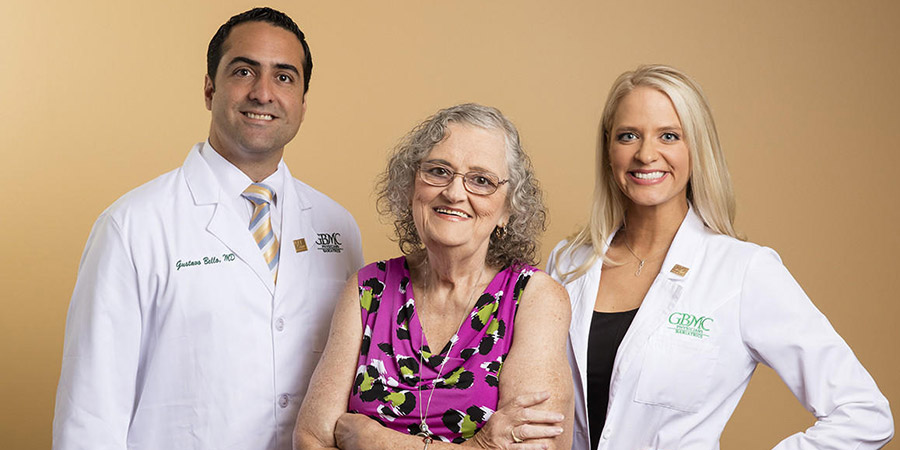Safe and effective weight-loss surgery: The health benefits of fighting obesity extend far beyond the aesthetic improvements
July 16, 2015
Image: Helen Roby with Dr. Elizabeth Dovec and Dr. Gustavo Bello. Roby has lost 165 pounds with a combination of bariatric surgery and healthy lifestyle choices.
Two years ago, when Helen Roby went for a dip in the pool at her son’s house, it took four men to get her out. At 335 pounds, she couldn’t get into or out of a chair, needed a walker and because of her weight, suffered from diabetes, gout and high blood pressure.
Today, the 71-year-old former school principal has lost 165 pounds and her obesity-related conditions are gone. “Last Fourth of July,” she said, “I got up that pool ladder and danced on the deck. I have so much energy.”
It wasn’t a miracle drug or crash diet that got her there. It was a combination of bariatric surgery and a total commitment to lifestyle change — the key elements of the Comprehensive Obesity Management Program at Greater Baltimore Medical Center.
People don’t have to live with these conditions or with depression related to obesity. We need to increase public awareness that there are good, safe options.
“People don’t have to live with these conditions or with depression related to obesity,” said Elizabeth Dovec, M.D., bariatric surgeon and director of the program. “We need to increase public awareness that there are good, safe options.”
To qualify for the program, a patient’s body mass index — a calculation based on height and weight — must be at least 40 kg/m2, or 35 to 39.9 kg/m2 with an obesity-related medical condition.
Advances in Cancer Care: GBMC offers personalized treatments that match patients with the most effective leading-edge procedures
When patients enroll in the program, bariatric surgery is not the first step. Participants must first spend between three and seven months learning about health and nutrition while developing what must become permanent new eating and exercise habits. Roby, for example, lost 40 pounds before she even had surgery.
When it’s time for surgery, Dovec and fellow bariatric surgeon Dr. Gustavo Bello provide two options. The laparoscopic sleeve gastrectomy removes most of the stomach leaving only a “sleeve” about the diameter of a garden hose. The laparoscopic Roux-en-Y gastric bypass sections off most of the stomach, leaving a pouch that’s smaller than the sleeve and restricts food intake even more. Dovec and Bello also offer a variety of revisional surgeries to patients who may have had a previous failed procedure or who need surgical adjustments such as from inadequate weight loss or weight gain, medical complications or unresolved co-morbidities.
“I usually allow patients to pick their own surgeries because I really want them to do their homework,” Dovec said. “When they do, they own it more and do better.”
Before entering the GBMC program, it’s important for patients to understand that surgery alone is not the answer.
“The first year is a honeymoon. Everybody loses weight and gets close to their goal within 12 to 18 months,” Dovec said. “That’s when the hard part sets in. If you go back to old behaviors, you're going to gain the weight back.”
The only way to maintain the weight loss, she explained, is by eating a high-protein diet, minimizing carbohydrate and sugar intake, and exercise. Roby, who had not been able to get out of a chair, now works out at the gym three times a week. Another of Dovec’s patients runs half marathons and is training for her first full marathon.
According to Dovec, the national average for weight loss maintenance after surgery is 85 percent — a huge difference from the national average for weight loss maintenance with diet and exercise alone, which is just 5 percent.
One reason for the program’s success is GBMC’s ongoing support system, which includes lifetime follow-up visits. There are also special events for patients, as well as an online support community in which Dovec and Bello participate daily.
“We’re there for the newcomers,” Roby said, “encouraging them and giving them all the help we can.”
The results transform patients' lives. “They have more confidence and get better jobs," Dovec said. "They can buy clothes off the rack. They can even fit into those little seats at Orioles games.”
- Maxine Nune for Greater Baltimore Medical Center


